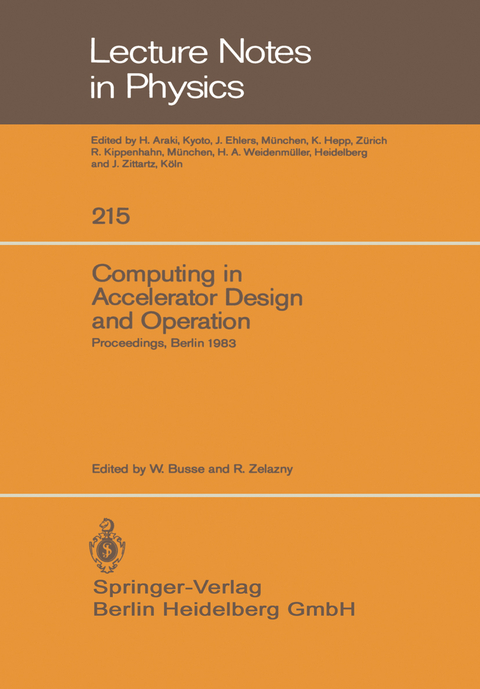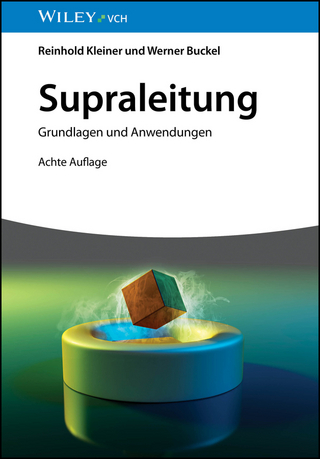
Computing in Accelerator Design and Operation
Springer Berlin (Verlag)
978-3-540-13909-6 (ISBN)
Future high energy accelerators.- Beam optics and dynamics.- Design of r.f. cavities.- Computer aided magnet design.- Beam instabilities and computer simulations.- Calculation of polarization effects.- Particle tracking in accelerators with higher order multipole fields.- Programs for designing the accelerating cavities for linear accelerators.- The MAGMI program for double pass electron linear accelerators.- A fortran program (RELAX3D) to solve the 3 dimensional poisson (Laplace) equation.- Calculation of three dimensional electric fields by successive over-relaxation in the central region of a cyclotron.- The design of the accelerating cavity for SuSe with the aid of the three-dimensional cavity calculation program CAV3D.- The further development of the calculation of the three dimensional electric field in the central region of the INR cyclotron.- Particle tracking using lie algebraic methods.- Numerical investigation of bunch-merging in a heavy-ion-synchrotron.- Nonlinear aspects of Landau damping in computer simulation of the microwave instability.- The transport theory of particle beam-congregation in six-dimensional phase space.- The MAD program.- Analogue computer display of accelerator beam optics.- A Monte Carlo beam transport program, REVMOC.- Multiparticle codes developed at GANIL.- MIRKO - an interactive program for beam lines and synchrotrons.- Aperture studies of the BNL colliding beam accelerator with reduced superperiodicity.- The study of misalignmental characteristics of beam optical components of HI-13 tandem.- Calculations for the design and modification of the 2 cyclotrons of S.A.R.A..- Magnetic field optimization and beam dynamics calculations for SuSe.- 'DFLKTR' the code for designing the electrostatic extraction system for cyclotrons.- RFQdesign considerations.- Effects of higher order multipole fields on high current RFQ accelerator design.- Versatile codes and effective method for orbit programming with actually existing first harmonics in cyclotron.- Calculations of the heavy ion saclay tandem post accelerator beams.- Electron injector computer simulations.- Numerical simulations of orbit correction in large electron rings.- Simulation of polarization correction schemes in e+e? storage rings.- Computation of electron spin polarisation in storage rings.- Archsim: A proton synchrotron tracking program including longitudinal space charge.- A method for distinguishing chaotic from quasi-periodic motions in orbit tracking programs.- PATH - a lumped-element beam-transport simulation program with space charge.- Workshop no. 1. Computer programs for lattice calculations.- Digital control of accelerators - the first ten years.- Distributed digital control of accelerators.- Centralized digital control of accelerators.- Concurrent control of interacting accelerators with particle beams of varying format and kind.- Integrated control and data acquisition of experimental facilities.- Software engineering tools.- Centralization and decentralization in the TRIUMF Control System.- The Fermilab Accelerator Controls System.- The control system for the daresbury synchrotron radiation source.- The microprocessor-based control system for the Milan superconducting cyclotron.- The ELSA control system hardware.- Computer control system of polarized ion source and beam transport line at KEK.- Computer control system of TRISTAN.- The system for process control and data analysis based on microcomputer and CAMAC equipment in the LAE 13/9 linear electron accelerator.- Some features of the computer control system for theSpallation Neutron Source (SNS) of the Rutherford Appleton Laboratory.- Design criteria for the operation of accelerators under computer control.- Computer aided control of the bonn penning polarized ion source.- Treatment and display of transient signals in the CERN antiproton accumulator.- Fast CAMAC-based sampling digitizers and digital filters for beam diagnostics and control in the CERN PS complex.- Automated cyclotron magnetic field measurement at the University of Manitoba.- On the problem of magnet ramping.- High level control programs at NSLS.- The minicomputer network for control of the dedicated synchrotron radiation storage ring BESSY.- The electronic interface for control of the dedicated synchrotron radiation storage ring BESSY.- to computing for accelerator operation.- Man-machine interface versus full automation.- Models and simulations.- Operations and communications within the Daresbury nuclear structure facility control system.- Consoles and displays for accelerator operation.- Operator interface to the oric control system.- Computer aided setting up of VICKSI.- GANIL beam setting methods using on-line computer codes.- A multi-processor, multi-task control structure for the CERN SPS.- Computer codes for automatic tuning of the beam transport at the Unilac.- Interactive testprogram for ion optics.- Numerical orbit calculation for a linac and improvement of its transmission efficiency of a beam.- The computerized beam phase measurement system at GANIL its applications to the automatic isochronization in the Separated Sector Cyclotrons (SSC) and other main tuning procedures.- On-line optimization code used at Saturne.- Automatic supervision for Saturne.- A local computer network for the experimental data acquisition at BESSY.- Closing remarks.
| Erscheint lt. Verlag | 1.12.1984 |
|---|---|
| Reihe/Serie | Lecture Notes in Physics |
| Zusatzinfo | XII, 578 p. 193 illus. |
| Verlagsort | Berlin |
| Sprache | englisch |
| Maße | 170 x 244 mm |
| Gewicht | 980 g |
| Themenwelt | Naturwissenschaften ► Physik / Astronomie ► Atom- / Kern- / Molekularphysik |
| Naturwissenschaften ► Physik / Astronomie ► Festkörperphysik | |
| Naturwissenschaften ► Physik / Astronomie ► Thermodynamik | |
| Technik | |
| Schlagworte | Accelerator Operation • Akzeleration • Automation • Beschleunigungsmessung • Complexity • computing • Design • Development • Forschung • Optics • Optimization • Physics • programming • Simulation • Software • Transport |
| ISBN-10 | 3-540-13909-5 / 3540139095 |
| ISBN-13 | 978-3-540-13909-6 / 9783540139096 |
| Zustand | Neuware |
| Haben Sie eine Frage zum Produkt? |
aus dem Bereich


